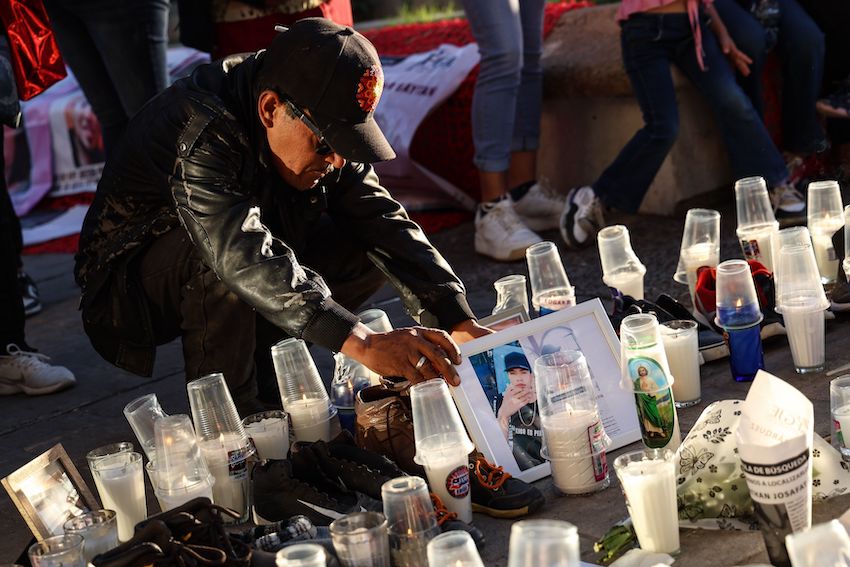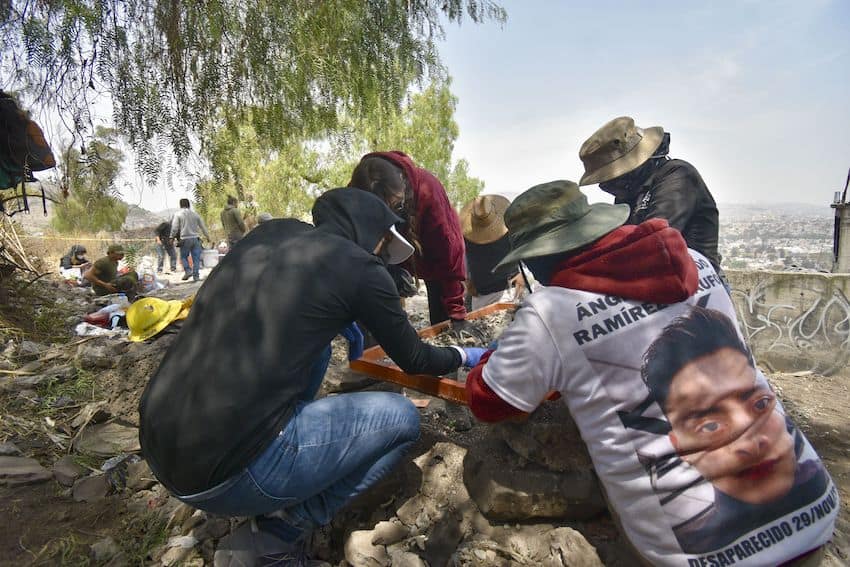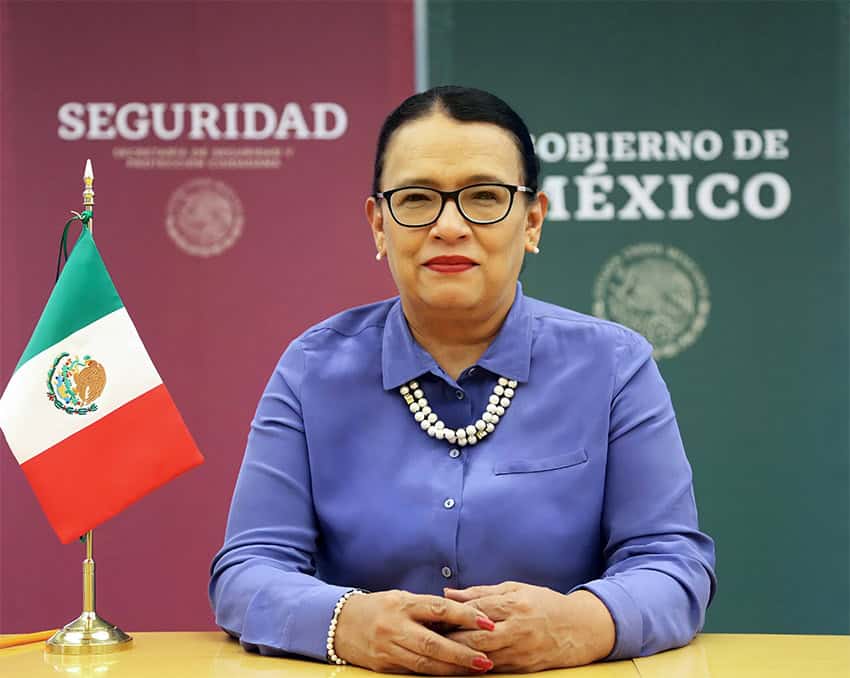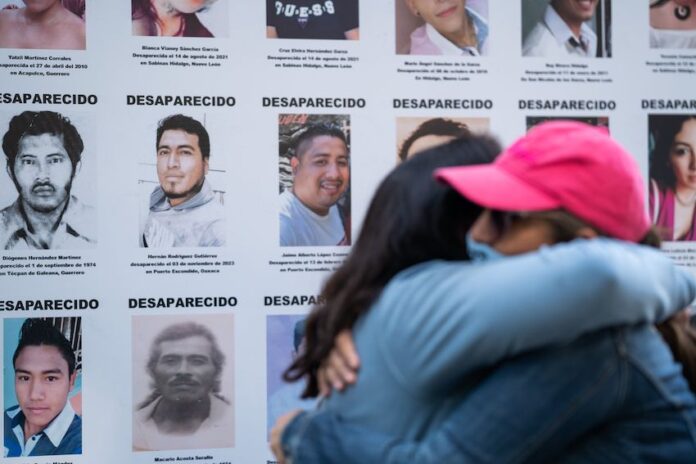The United Nations’ Committee on Enforced Disappearances (CED) said Friday that it would seek additional information from the Mexican government after receiving information that “seems to indicate” that enforced disappearances is a “widespread and systematic practice” in Mexico.
The announcement drew a pointed response from the Mexican government, which said in a statement that it “rejects the statements of the committee members regarding the alleged practice of enforced disappearance by the state.”

According to the United Nations, “an enforced disappearance is considered to be the arrest, detention, abduction or any other form of deprivation of liberty by agents of the state or by persons or groups of persons acting with the authorization, support or acquiescence of the state.”
The abduction and presumed murder of 43 students in Guerrero in 2014 is one example of a case in which the Mexican state was allegedly involved. There have been many other cases of abduction over the years in which Mexican authorities were involved, or allegedly involved.
The CED’s airing of the allegation that the carrying out of enforced disappearances is a “widespread and systematic practice” in Mexico came during concluding remarks at the committee’s 28th session, held between March 17 and April 4 in Geneva, Switzerland.
“This session was also the occasion to look at another worrying situation, that of Mexico,” said CED chairperson Olivier de Frouville, according to the United Nations’ simultaneous interpretation of his remarks in French.
“… The committee has received information which seems to indicate — substantiated indications according to which … [enforced disappearance] is a widespread and systematic practice … in the territory under the jurisdiction of Mexico,” he said without specifying who provided the information.
De Frouville said that the CED, under article 34 of the International Convention for the Protection of All Persons from Enforced Disappearance (ICPPED), “has therefore decided initially” to request “any relevant information” from the government of Mexico “on this situation.”
The request is a first step toward the CED potentially referring the matter to the General Assembly of the United Nations as article 34 of the convention states that:
“If the Committee receives information which appears to it to contain well-founded indications that enforced disappearance is being practiced on a widespread or systematic basis in the territory under the jurisdiction of a state party, it may, after seeking from the state party concerned all relevant information on the situation, urgently bring the matter to the attention of the General Assembly of the United Nations, through the Secretary-General of the United Nations.”
De Frouville said that the request for information from Mexico “does in no way preempt subsequent stages of the procedure.”
“This request for information will be transmitted in the upcoming weeks to the state party,” he added.

“… The committee’s aim is to have with the state cooperation and constructive exchanges in order to achieve our joint goal, which is full and complete implementation of the convention,” de Frouville said.
Citing “social organizations,” La Jornada newspaper reported that it is the first time that the CED has initiated the ICPPED’s article 34 procedure.
The CED’s consideration of enforced disappearances in Mexico at its 28th session came after a search collective found evidence early last month that suggested that a ranch in the state of Jalisco was used by the Jalisco New Generation Cartel (CJNG) to kill and/or cremate scores of people.
The property in the municipality of Teuchitlán was widely referred to as an “extermination camp” in the media, but authorities have not confirmed that people were killed there, only saying that the CJNG used the Izaguirre ranch to train new recruits.
Search collective calls on authorities to investigate a grisly find in Jalisco
While murder and abductions are common in Mexico — more than 120,000 people are classified as missing — the Teuchitlán case shocked the nation, and prompted President Claudia Sheinbaum to announce six “immediate” actions against the crime of enforced disappearance.
The CED said in a 2022 report that was informed by a visit to Mexico in late 2021 by four of its members that impunity in missing person cases in Mexico is “almost absolute.
With regard to the Teuchitlán case, the United Nations’ committee last week issued a range of advice to Mexican authorities, including recommendations that they adequately protect all bone fragments and other evidence found at the property and immediately subject human remains to genetic testing.
The CED’s advice, or recommended “precautionary measures,” was issued in response to a request made by the organization Solidaria and the Plataforma por la paz y justicia en Guanajuato (Platform for Peace and Justice in Guanajuato).
📍El Comité vs Desapariciones Forzadas #CED de @ONU_es dicta medidas cautelares a 🇲🇽 por hallazgo en #Teuchitlán. Tras petición de @solidaria_sc y @plataformagto pide entre otras cosas: resguardar el Rancho Izaguirre, resguardar restos y elementos de prueba, análisis genéticos.👇🏽 pic.twitter.com/RBU2meQX7D
— Elia AlmanzaA 💜💚💗 (@EliaAlmanzaA) April 4, 2025
Solidaria and the aforesaid platform — which describes itself as an “academic, political and social project for the strengthening of victims’ collectives and movements in Guanajuato” — detailed the CED’s recommended measures in a joint statement.
During the first six months of Sheinbaum’s presidency, almost 16,000 people were reported as missing, of whom 7,825 have not been located, according to official statistics cited by La Jornada in a report published on Sunday.
‘The Mexican government does not consent to, allow or order the disappearance of persons’
In a statement issued on Saturday, the Interior Ministry (SEGOB) said that Mexico, as a state that is party to the ICPPED, “maintains sustained cooperation” with the CED.
SEGOB subsequently noted that the CED said that it would seek information from Mexico related to “the situation of disappearances in the country.”
“… The Mexican state will analyze said request once it is received in order to share the actions and programs that are implemented at a national level to attend to and combat the phenomenon of disappearances in Mexico,” the ministry said.
“The government of Mexico rejects the statements of members of the committee regarding the alleged practice of enforced disappearance by the state. The Mexican government doesn’t consent to, allow or order the disappearance of persons,” SEGOB said.

“Mexico is committed to the unconditional respect of human rights and addressing the causes of violence. It has also made clear its commitment to combat this scourge and has announced the implementation of forceful actions to this end,” the ministry added.
In an interview with La Jornada, Interior Minister Rosa Icela Rodríguez rejected any claim that the federal government carries out enforced disappearances. She also said that there is no “real” figure on the number of missing persons in Mexico because some cases aren’t reported due to lack of trust in authorities, while some people continued to be classified as missing even after they’re found because families don’t report the location of their loved ones.
The previous government conducted a missing persons “census” in an attempt to determine an accurate number, but faced criticism from non-governmental organizations, search collectives and academics, who warned that the administration of former president Andrés Manuel López Obrador may have been seeking to reduce the number of people officially listed as missing for electoral purposes.
With regard to the CED chairperson’s remarks, Mexico’s National Human Rights Commission (CNDH) said in a statement that it believes that de Frouville is wrong to suggest that the Mexican state is involved in the carrying out of abductions.
“We believe that the position of the president of the Committee on Enforced Disappearances is completely disconnected from the reasons that cause the persistence of disappearances in our country.”
In effect, what the CNDH said was that dedicated kidnapping rings and members of criminal organizations, such as powerful drug cartels, are responsible for abductions in Mexico — not Mexican authorities.
The Plataforma por la paz y justicia en Guanajuato said that the CNDH’s denial of responsibility on behalf of the Mexican state was “pitiful.”
“What have they done to comply with the recommendations the CED issued in 2021?” it asked.
By Mexico News Daily chief staff writer Peter Davies (peter.davies@mexiconewsdaily.com)
